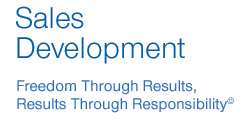Prospect Objections are THEIRS. Don’t make them yours.
March 5th, 2015Do you spend time during Sales calls over-coming objections?
If your answer is “yes”, you are losing out on sales. Lots of them. You are also diminishing trust and burning up profit.
If your answer is “yes,” why are you choosing to give the prospect something to object to in the first place?
A buyer can never object to anything unless you provide them with an opportunity to object to something. If you are guilty of doing this, you are certainly in the majority. Most salespeople (and principals who sell) spend most of their time telling (when they should be learning) and offer up a continuous barrage of great opportunities to object. They actually choose to lose.
At this point you may be thinking, “how is the buyer going to know how great we are if I don’t tell him/her?” The answer is simple and it resides in timing. Most salespeople tell way too soon during a sales interview (by the way - it should be an interview, not a presentation…)
If you manage prospect interactions properly, and if you provide them with the opportunity to tell you what they want, they will. If you manage interviews properly and remain patient and disciplined, prospects will tell you exactly what they want. Unfortunately, most salespeople never give a prospect this opportunity. Instead, they begin to blather way too early in the conversation, teeing up tons of opportunities for objections. The result is lost effectiveness, lost margins, lost sales, and lost profit.
Talking when you should be listening is just one example of a rampant dysfunctional condition known as Premature Satisfaction™ (aka: The Destroyer of Profit). Launching proposals too early in the cycle is another epidemic example.
Stop creating opportunities for prospect objections. The elimination of Premature Satisfaction™ is simply a choice. Once you choose, the cure simply requires patience, the habit of discipline and a little practice.
Joe
Copyright © Joe Zente 2015. All Rights Reserved.









